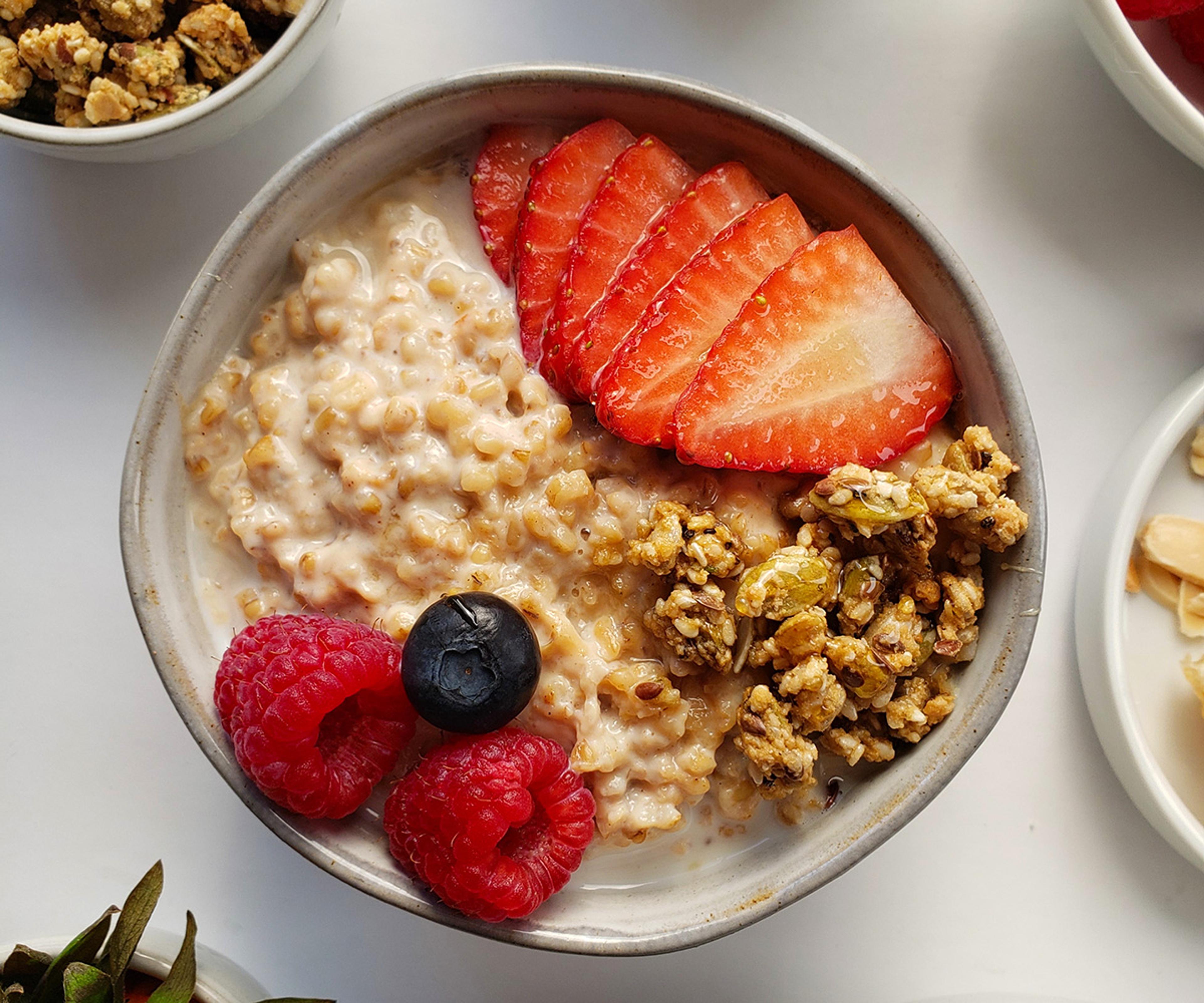
Food
Food as Medicine: Reduce Stress with Mindful Eating
Although food and eating are often thought of as physical acts, our thoughts and emotions often come into play as well when deciding what to put into our bodies. As a registered dietitian, I frequently coach clients not only on what to eat but also on how to eat mindfully.
Mindful eating is all about balance—striking the right balance between feeding our bodies well and finding enjoyment in our food. During times of stress (such as most of 2020, for many of us) food may begin filling a role that it is not meant to. This can lead to food choices that too often do not nourish us properly, and we may struggle to learn other coping skills when we are experiencing emotional turmoil.
When we notice the balance starting to shift away from food mostly being for nutrition and fuel, it is time to learn some mindful eating practices to help keep us healthy—physically, and emotionally.

Photo contributed by Chef Daniela Gerson.
My favorite strategies for mindful eating
Listen to your body
Emotional or boredom eating often occurs at night when we feel low. In these moments, take time to notice if you are truly hungry, or if you are simply bored, lonely, or in need of other emotional support. During meals, pause for a few minutes before getting seconds to see if you are really still hungry. If you are, then certainly feed your body the food it needs. If not, then find another activity you can engage in or find support to fill that void instead.
Find alternatives
The occasional sweet or treat can often help improve mood, but if eaten too often, it loses its effect and can even contribute to mood challenges. If you are finding yourself wanting to emotionally eat, find active or mentally engaging things to do instead, such as reading a book, taking a walk, stretching, or calling a friend. Watching TV or scrolling on your phone doesn’t work because they are passive. I recommend keeping a list of alternatives handy to rely on when you feel the urge to eat and aren’t hungry.
Play chef
Turn the act of cooking into an enjoyable and mindful experience by putting on music, getting creative with new foods and recipes, and even getting the kids involved (unless you use cooking as alone time, which is also really good self-care).

Photo contributed by Sarah Ricci.
Make food beautiful
Present your food and even the table setting in a way that is pleasing to the eye. Serve foods that vary in color and texture, arrange them nicely on the plate, or add any extra touches that make your food look as good as it tastes. Even a small candle on the table can improve your dining experience. Putting in this extra effort can help you appreciate and enjoy food more, and it is a great form of creative expression.
Slow down
Try to eat in a calm setting while sitting down—not driving or on the go—as often as possible. Of course, this can be difficult for busy families, but I encourage you to slow down whenever you can. Focus on eating slowly and chewing your food thoroughly during meals. These habits help us eat the right amounts for our bodies and also promote proper digestion. Pause to savor and enjoy your food, limiting distractions such as phones or TV that take our attention away from eating mindfully. Consider picking up a set of conversation cards to inspire meaningful dinnertime conversation, which can also make mealtime fun and help everyone slow down.
Be grateful
Avoid eating while extremely stressed. It’s important to get out of “fight or flight” mode before eating if you can. Expressing gratitude can help you get into “rest and digest” mode, which not only helps you become more mindful, but also benefits digestion. This could include the animals and plants that are nourishing you, the farmers and workers who brought this food to your table, and those who prepared the meal. It could feel awkward at first if you’re not used to doing it, so start by incorporating gratitude even a few times a week, or make a point to practice on days when you feel particularly disconnected, anxious, or down. Like other mindfulness practices such as yoga and meditation, it will become more natural the more you do it.
Plan ahead
Mindful eating doesn’t only happen during a meal. Weekly meal planning can help increase mindfulness by ensuring you are getting variety and balance in your diet. This helps you make better choices while shopping and at mealtimes—when we are hungry, our healthy-eating intentions seem to go out the window. If you plan well and meal prep ahead of time (even if it’s only chopping veggies and portioning snacks), you’ll be more likely to stick to what you planned to eat that day, especially if you are stressed or in a hurry.
By being mindful before and during your meal, you can turn potentially stressful moments into moments of self-care. If you end up having chips and salsa for dinner one night because you’re too “hangry” to make a better choice, don’t dwell on it or feel guilty. Your next meal is a positive opportunity to get back on track.

Photo contributed by Amy Rosoff Davis.
Good Mood Foods
Besides practicing mindful eating habits, we can also help ourselves by choosing foods that support our mood and mental health. Some of my favorites include:
Probiotic- and prebiotic-rich foods
Such as yogurt, sauerkraut, kimchi, kefir and kombucha
Foods rich in probiotics, such as fermented foods and some cultured foods, help create serotonin, the neurotransmitter that helps us feel calm and happy. It is estimated that 90% to 95% of the body’s serotonin is made by beneficial gut bacteria, so getting probiotics in the diet is essential for a healthy mood.
Consuming plenty of fiber from plant foods, such as vegetables, beans, nuts, tubers, and fruit, provides prebiotics that help these gut microbes thrive.
Pasture-raised meat, eggs, and dairy
The protein in animal foods is the most usable by the body, and it provides many other nutrients such as B12, healthy fats, iron, folate, and choline. In addition, the amino acids in these protein-rich animal foods are the building blocks for neurotransmitters such as serotonin and dopamine, which our brains need to experience pleasure and calmness. If you struggle with overeating or are managing your weight, eating protein helps reduce cravings for less-desirable foods like sweets and increases satiety.
Meat and dairy supply vitamin B12 needed for energy production and nervous system function.
Omega-3 fatty acids have been shown to reduce inflammation and support brain health and mental health. Small amounts of omega-3s are found in grass-fed meat, dairy, and eggs, and larger amounts can be obtained from fatty fish such as salmon.
Red meat is the best source of iron, needed for energy. Liver, in addition to its rich iron content, supplies folate to support mental health.
Egg yolks supply choline, which supports brain function and healthy cell membranes.
Consider Organic Valley dairy, eggs, and meats when making your good mood food plan!

Photo contributed by Amy Rosoff Davis.
Vitamin D-rich foods
Vitamin D is strongly linked to mood and mental health and is especially important during the winter, as we get most of our vitamin D from sunshine in the warmer months. Vitamin D-rich foods like pastured pork, liver, fatty fish, and eggs offer extra support when sunshine is lacking. This vitamin is fat-soluble, so it is only found in the fat and yolks. While grass-fed milk contains some naturally occurring vitamin D, store-bought milk is fortified with vitamin D, so this supplemental source is significant in the diet.
We can support or reinvigorate our mood and mental health by practicing mindful eating strategies and choosing foods that promote a healthy, balanced diet—as well as foods that we enjoy! By creating healthy habits and mindsets that help us adapt to the world around us rather than try to control it or be perfect, we are taking good care of our physical and mental selves. However, if you struggle with mental health issues, do not hesitate to find a mental health practitioner who can provide the support you need. A counselor or dietitian can also be beneficial if mindful eating practices are a challenge for you.
This new year, practice listening to your body, nourish yourself in whatever ways you can, and get outside help when you need it. Let’s start letting food and eating be radical acts of self-care.
Originally from Kansas City, Missouri, Laura Poe Mathes, R.D., moved all over the U.S. before figuring out that she is a country girl at heart, settling down in the Driftless Region of southwest Wisconsin with her husband. She is a private practice dietitian, functional movement coach, writer and speaker on health and traditional cooking techniques, such as fermentation and cooking with organ meats. She loves to spend time with her family and be in nature. Learn more about her at Viroqua Nutrition Counseling and on her recipe blog, Brine and Broth.
Related Articles
- Tags:
- cooking & entertaining,
- organic nutrition,
- meal prep
















